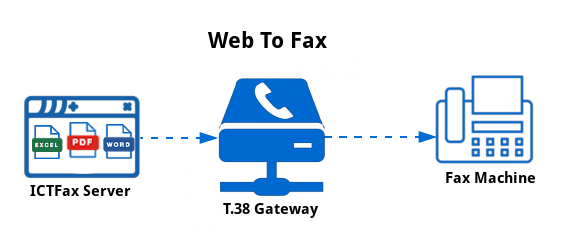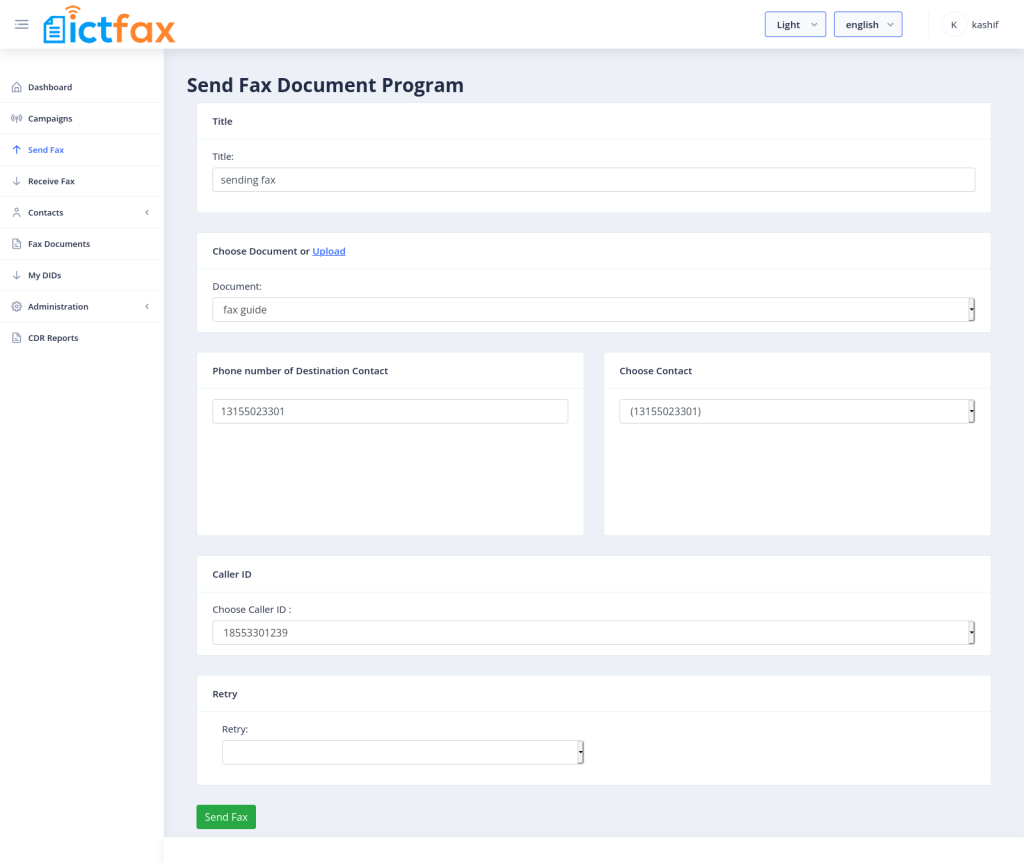The evolution of fax servers has spanned multiple decades, marked by significant advancements. In its early days, fax servers were independent devices that demanded physical presence for fax transmission and reception. However, these systems have undergone a remarkable transformation. Today, fax servers have shifted into cloud-based applications, offering the convenience of accessibility from anywhere with an internet connection. This technological transition empowers businesses to streamline their communication processes, ultimately leading to heightened productivity.
If you’re contemplating the adoption of a fax server, it’s imperative to consider several critical factors. Firstly, determining the key features that align with your specific requirements is essential. Fax servers come with varying sets of features, with some offering extensive capabilities while others remain more basic in functionality. Secondly, budget considerations should be taken into account. The cost range for fax servers can vary significantly, ranging from a few hundred dollars to several thousand dollars. Lastly, compatibility with your existing business systems holds paramount importance. Ensuring seamless integration between the selected fax server and your current infrastructure is crucial for achieving optimal performance.
Evolution of Fax Server:
The Rise of Fax Machines and Their Limitations
The 20th century witnessed the emergence of fax machines as a groundbreaking mode of communication, fundamentally altering the way documents were transmitted through telephone lines. This technological innovation rapidly gained widespread acceptance among both businesses and individuals, primarily because it offered a swifter and more efficient alternative to conventional mail. However, despite its numerous advantages, fax machines were not exempt from limitations. These limitations encompassed the necessity for physical equipment, paper usage, and the inherent inconvenience associated with manual document handling.
Introduction to Fax Servers
With the rise of digital technology, the advent of fax servers introduced a significantly streamlined and efficient approach to fax transmission. Serving as intermediaries bridging fax machines and digital networks, fax servers transformed the process by converting incoming faxes into digital files and then directing them to recipients’ email inboxes or network folders. This pioneering advancement effectively eliminated the need for physical fax machines and paper documents, thereby simplifying and modernizing the entire faxing process.

Transition to Digital Faxing
As businesses increasingly embraced digital communication, the concept of digital faxing gained traction. Fax servers evolved to support online faxing, allowing users to send and receive faxes directly from their computers or mobile devices. This transition to digital faxing eliminated the need for dedicated fax lines and physical fax machines, reducing costs and improving efficiency.
Integration with Existing Systems
Modern fax servers have been meticulously designed to seamlessly integrate with existing communication systems, which may encompass email servers and document management platforms. This integration empowers users by enabling them to send and receive faxes through familiar interfaces and workflows, eradicating the need for separate applications or manual procedures. Consequently, fax servers have evolved into an indispensable component of the overall communication infrastructure.
The evolution of fax servers has sparked a revolution in the way businesses handle fax communications. Progressing from traditional fax machines to the realm of digital faxing and seamless integration with existing systems, fax servers have emerged as a pivotal tool for businesses seeking to streamline workflows, enhance productivity, and capitalize on the advantages of digital communication. In the forthcoming sections, we will delve deeper into the specific benefits, features, and considerations associated with implementing fax servers.
Benefits of Fax Server:
Enhanced Document Security
Utilizing fax servers presents a significant advantage in terms of heightened document security. In contrast to traditional fax machines, where documents can be left unattended or vulnerable to unauthorized access, fax servers offer a robust suite of security features. These encompass encrypted transmissions, secure storage, and user authentication protocols, all working in tandem to safeguard sensitive information throughout the entire faxing process. This level of security is especially vital for industries that handle confidential data, including healthcare, legal, and finance, where maintaining the privacy and integrity of information is paramount.
Improved Workflow Efficiency
Fax servers play a pivotal role in streamlining document workflows, effectively eradicating the necessity for manual handling and reducing administrative burdens. Incoming faxes are seamlessly transformed into digital files, simplifying the process of organization, storage, and retrieval of documents. Through features such as automatic routing, fax servers can efficiently direct incoming faxes to the appropriate recipients or departments, thereby saving valuable time and ensuring the seamless distribution of documents. Furthermore, fax servers offer the capability to send multiple faxes concurrently, further enhancing the efficiency of document workflows.
Cost Reduction and Time Savings
By implementing fax servers, businesses can significantly reduce costs associated with traditional faxing methods. Eliminating the need for physical fax machines, paper, ink, and dedicated phone lines leads to cost savings in terms of equipment maintenance and supplies. Fax servers also reduce labor costs by automating document handling tasks and freeing up staff time for more critical responsibilities. The time saved through streamlined workflows and faster document transmission translates into increased productivity and efficiency.
Compliance with Legal Requirements
In specific industries, notably healthcare and legal, stringent regulations dictate document transmission and confidentiality. Fax servers come equipped with features that are specifically designed to support compliance with these stringent regulations. These features include comprehensive audit trails that meticulously record document activities, electronic signature capabilities for authentication, and secure transmission protocols to safeguard sensitive information during transit. Additionally, fax servers offer functionalities such as fax archiving and retrieval, simplifying the process of storing and accessing faxed documents for compliance and legal purposes. These capabilities ensure that organizations in these highly regulated sectors can meet their obligations while maintaining the utmost document security and integrity.
Increased Accessibility and Mobility
Fax servers offer users the flexibility to send and receive faxes from virtually anywhere, provided they have internet access. This heightened accessibility and mobility are particularly advantageous for businesses with remote or dispersed teams. Users can conveniently access their faxes through email or web interfaces, facilitating seamless collaboration and enabling prompt responses to faxed documents. Moreover, many fax server vendors provide mobile apps that further enhance accessibility. These apps empower users to send and receive faxes on the move, irrespective of their physical location, thus optimizing communication efficiency and responsiveness.
Features of Fax Server:
Faxing:
This is the most basic feature of a fax server. It allows users to send and receive faxes. Fax servers can be used to send and receive faxes to and from other fax machines, as well as to and from email addresses.
Document management:
Indeed, fax servers extend their utility beyond mere fax transmission and reception. They are also adept at document management, offering a range of features encompassing document storage, searchability, and sharing. These servers have the capacity to store documents in multiple formats, including PDF, TIFF, and Word, ensuring compatibility with various file types. Users benefit from efficient document retrieval through keyword or date-based searches, simplifying the process of finding specific information. Moreover, fax servers facilitate document sharing, enabling users to distribute documents to others through email or by uploading them to popular file-sharing services. This multifunctionality enhances overall document management and collaboration within organizations.
Security:
Fax servers can be used to protect sensitive documents. This includes features such as encryption and authentication. Encryption can be used to scramble the contents of a fax so that it cannot be read by unauthorized users. Authentication can be used to verify the identity of the sender or recipient of a fax.
Reporting:
Fax servers can be used to generate reports on fax activity. This can be helpful for tracking usage and troubleshooting problems. Reports can show the number of faxes that have been sent and received, the number of pages that have been faxed, and the time and date of faxes that have been sent and received.
Integration:
Fax servers can be integrated with other business systems, such as email and CRM systems. This can help businesses to streamline their communication and improve their productivity. For example, a fax server can be integrated with an email system so that faxes can be sent and received as email messages. A fax server can also be integrated with a CRM system so that faxes can be tracked and managed as part of the customer relationship management process.
Fax broadcasting:
This feature allows users to send the same fax to multiple recipients. This can be helpful for businesses that need to send out mass mailings or that need to keep in touch with a large number of customers or clients.
Fax queuing:
This feature allows users to send faxes at a later time. This can be helpful for businesses that need to send faxes during off-hours or that need to send faxes on a specific date or time.
Fax tracking:
This feature allows users to track the status of faxes that have been sent. This can be helpful for businesses that need to know when a fax has been received or that need to troubleshoot problems with fax delivery.
Fax logging:
This feature allows users to log all fax activity. This can be helpful for businesses that need to keep track of fax usage or that need to comply with regulations that require the logging of fax activity.
These are just some of the features that a fax server can offer. The specific features that are available will vary depending on the fax server that you choose.
If you are considering using a fax server, it is important to choose one that has the features that you need. You should also consider the price of the fax server and its compatibility with your existing business systems.

Conclusion:
Fax servers have emerged as a vital tool for businesses seeking to streamline their communication processes, boost productivity, and embrace the benefits of digital technology. Through their enhanced document security, improved workflow efficiency, cost reduction, compliance support, and increased accessibility, fax servers have proven to be a game-changer for modern enterprises.
The evolution of fax servers has bridged the gap between traditional faxing methods and the digital age. By leveraging features such as online faxing, fax broadcasting, fax archiving and retrieval, integration with email and document management systems, OCR capabilities, secure transmission, and scalability, businesses can optimize their fax communication workflows and achieve significant efficiency gains.
Leveraging Open Source in ICT
